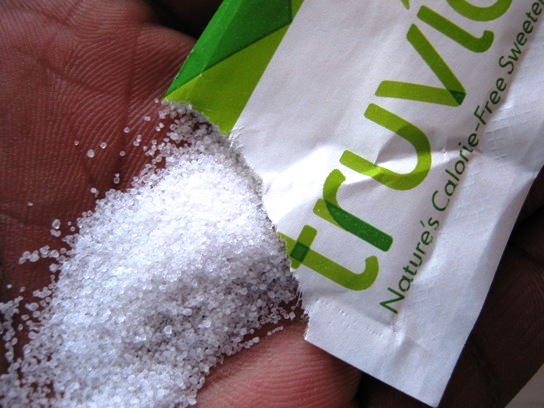Truvia: Good or Bad?

Many people are trying to reduce the amount of sugar they are eating.
Not surprisingly, a ton of different sugar substitutes have entered the market.
Truvia is one of them.
It is aggressively marketed as a natural, stevia-based sweetener that is good for blood sugar control.
But is Truvia really healthy, and is it as natural as they say?
Let’s find out.
What is Truvia?
Truvia is a sweetener developed jointly by Cargill and Coca-Cola.
If you didn’t know, Cargill is a massive company that produces ingredients and additives for some of the world’s biggest food companies.
Truvia was launched in 2008, and is now the second best-selling sweetener in the US (right after Splenda).
It is manufactured from a blend of three ingredients, which are:
- Erythritol: a sugar alcohol.
- Rebaudioside A: a sweet compound isolated from the stevia plant, listed as Rebiana on the label (1).
- Natural Flavors: it is unclear exactly what this means.
Truvia is often confused with stevia, a natural sweetener made from the stevia leaf.
This is not surprising given that Truvia is advertised as a “stevia-based” sweetener and has a name that sounds similar
However, Truvia and stevia are not the same thing.
Bottom Line: Truvia is the second most popular sugar substitute in the US. It contains erythritol, rebaudioside A and “natural flavors.”
There’s no Stevia in The Truvia Sweetener, Only Tiny Amounts of Rebaudioside A
“The best sweetness comes from nature. Truvia sweetener is natural, great-tasting sweetness born from the leaves of the stevia plant.”
This quote, from the Truvia website, is terribly misleading.

Truvia barely contains any components of the stevia plant, and certainly none of the health benefits.
Stevia leaves contain two sweet compounds, stevioside and rebaudioside A.
Of the two, stevioside (but NOT rebaudioside A) has been linked to health benefits like lower blood sugar levels and reduced blood pressure (2, 3).
However, there is no stevioside in Truvia, only tiny amounts of purified rebaudioside A, which has not been linked to any health benefits.
For this reason, marketing Truvia as a “stevia-based” sweetener is highly questionable.
Bottom Line: Rebaudioside A is the stevia compound used in Truvia. It does not contain stevioside, the compound in stevia that provides health benefits.
Erythritol is the Main Ingredient

The primary ingredient in Truvia is actually erythritol.
Erythritol is a sugar alcohol that can be found in some natural foods like fruits. It can also be extracted and refined to use as a sweetener in foods.
According to Cargill’s website, they manufacture erythritol by processing corn into a food grade starch, which is then fermented with yeast to create a broth.
This is then purified further to create erythritol crystals.
Erythritol is a sugar alcohol because the molecule is like a hybrid of a carbohydrate and an alcohol (it is nothing like ethanol though, which is the type of alcohol that gets you drunk).
The chemical structure of sugar alcohols gives them the ability to stimulate the sweet taste receptors on your tongue.
Sugar alcohols are common in the Western diet and include xylitol, sorbitol, and maltitol, to name a few.
But erythritol appears to be quite different from the others. It has a unique chemical structure that our bodies cannot break down and digest.
It basically goes unchanged through your system and out with your urine, so it has almost no calories and none of the harmful metabolic effects of excess sugar (4).
Multiple long-term studies on metabolism and toxicity have found no negative effects of erythritol consumption, at least not in test animals (5, 6).
Bottom Line: Erythritol is the main ingredient in Truvia. It does not cause harmful metabolic effects like sugar, and is considered safe.
“Natural Flavors” in Truvia
The last ingredients in Truvia are “natural flavors.” They are a bit of a mystery.

What the added flavors are exactly, and how they are created, is neither specified on the label nor the website.
But they aren’t legally obligated to disclose what they are, and the combination of these “flavors” with rebaudioside A was patented by Cargill in 2009.
However, it is fair to assume that the natural flavors are probably not that natural. The term is very loosely regulated by the FDA.
A company is free to label any flavor as natural, as long as it is chemically equivalent to a natural flavor.
Bottom Line: What “natural flavors” means is not disclosed. However, it is most likely an assortment of chemicals that are not really “natural.”
Truvia Has Almost no Calories and no Effect on Blood Sugar

Truvia is nothing like sugar, because it is made almost entirely of erythritol.
Compared to table sugar, which has 4 calories per gram, erythritol has only 0.24 calories per gram.
It is near impossible to consume enough to affect your body weight.
And because erythritol is not metabolized by the body’s cells, it does not have any effects on blood sugar or insulin, cholesterol, triglycerides or other biomarkers (7, 8).
For those who are overweight, diabetic or have issues related to the metabolic syndrome, Truvia (or plain erythritol) is a good alternative to sugar.
Bottom Line: Truvia is virtually calorie free. The erythritol is not metabolized by the body, and has no effect on blood sugar or other health markers.
Truvia Was Taken to Court for the “Natural” Claims

Unfortunately, the exact chemicals used in the patented manufacturing process of Truvia are unknown to the public.
But based on the refined ingredients in Truvia, it’s quite clear that not much about it is “natural.”
In 2012 and 2013, two class-action lawsuits were filed against Cargill for its deceptive marketing and use of the word “natural.”
The suits claimed that the Rebaudioside A and erythritol used are “highly processed”, and that the erythritol they produce is derived from GMO corn.
Cargill decided to settle out of court.
However, they are still deliberately deceiving consumers and using the word “natural” all over their marketing material.
Bottom Line: Cargill, the company that makes Truvia, was taken to court for their deceptive use of the word “natural.” They settled out of court, but are still using this word in their marketing material.
Are There Any Side Effects?

Some of the ingredients have been studied, but the effects of the Truvia sweetener itself have never been studied.
In a 4-week human trial using a high dose of rebaudioside A, no adverse side effects were found.
This study was sponsored by Cargill, the company that manufactures Truvia (9).
A recent controversial study found that erythritol ingestion was toxic to the common fruit fly. The authors even recommended it as an environmentally safe pesticide (10).
These findings raised concerns, but this doesn’t really have any relevance to humans or other mammals, which tolerate erythritol just fine.
However, the main concern with sugar alcohols like erythritol, is that they may cause digestive problems.
It seems that erythritol is better tolerated than the other sugar alcohols, because most of it gets absorbed and then peed out. It doesn’t reach the large intestine in significant amounts (11).
One study showed that digestive symptoms only occured when ingesting 50 grams of erythritol in a single dose, which is a very large amount (12).
Another found that it took at least 4 times the amount of erythritol to cause diarrhea compared to sorbitol, a commonly consumed sugar alcohol (13).
Tolerance varies between individuals, so take all of this with a grain of salt. If you have had problems with sugar alcohols in the past, then be extra careful with Truvia.
That being said, regular use of Truvia shouldn’t cause digestive problems for most people, at least not if consumed in reasonable amounts.
Bottom Line: The key ingredients in Truvia are safe to consume, with little to no digestive side effects. However, tolerance can vary between individuals.
Truvia is Fine, But Definitely Not “Natural”
Although the marketing claims are bogus and the “natural flavors” mystery is a bit disturbing, Truvia seems to be mostly fine.
It contains almost no calories, does not affect blood sugar or insulin levels, and should have little to no side effects for most people.
It’s certainly better than sugar, and seems to be better tolerated than many other sweeteners.
So if you like the taste of Truvia, you tolerate it and want to include it in your life, then I don’t see any good reason to avoid it.
Even though it isn’t a natural sweetener and the marketing behind it is questionable, it seems to be healthier than many other sweeteners.
Source(s):
authoritynutrition.com
